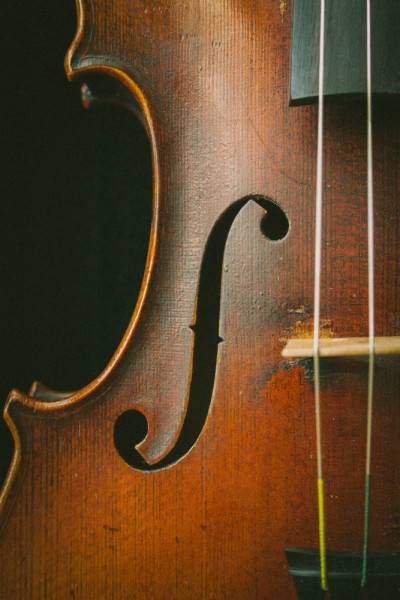Zelberg was not a terrorist. He was our third chair cellist; he had a tattoo of a small crown of thorns on the inside of his right wrist. He wore glasses. He declined our invitations for happy-hour beers, but Zelberg tuned for us if we had head colds and couldn’t hear properly. One of our violinists dated Zelberg after his wife died and said he had a tattoo of the Virgin of Guadalupe that spanned his entire back. After sex, she said, he would lie in bed blinking, his body and his mind drifting apart. He was with his wife already in all the ways except the breath he took, the slow sound that came from dragging the bow across the strings.
During intermission, while we were backstage dodging actors rushing to find fresh tape for their body mics, Zelberg stayed in the pit to sprinkle his wife’s ashes on our chairs, our music, our stands.
“So she can listen,” Zelberg had said, according to one of our bassists, who had stayed in the pit, too, to mentally rehearse his part for the first song of the second act. He’d gotten some of Zelberg’s wife on the tips of his fingers as he turned the pages of his music.
When the bassist showed us the ashes on his fingers, we blinked at each other in the muted blue light, confused: We knew Zelberg was strange—one of our flutists was from Alabama, and she’d called him “touched, bless his heart,” after she’d had too many beers at one of the happy hours—but we didn’t think he’d do this, this almost criminal, mostly pitiable thing.
Someone in the audience had panicked—an older woman in jade sequins had seen the white powder in the green velvet lining of the open violin cases, and called the police: A terrorist group, she said, breathless on the phone in the box office. A fanatic sect, anthrax.
The police arrived when we were tuning for the second act. They didn’t walk in time with the music, but were offensively off-beat. They disregarded the downbeat, stepping on the two and the three, and then the four and the three. We were affronted. (Later, faces flushed over beers at our bar, the guy who plays the timpani joked the policemen were oafs—probably middle-school orchestra bassists who spent their time pretending to jerk off with their bows. They probably always played F# when they were supposed to play F natural, too.)
Three officers descended the stairs from the house into the pit; we watched the reflection of the house lights dim in their boots. As they approached, the conductor lowered his bow and motioned for us to put down our instruments. We held them in resting position, hands curled around the necks of our violins and violas, bows on our knees, pointed up to the catwalk, from which the lights hung, swiveled, beamed. Our bows could have been weapons.
Zelberg plucked an A, frowned, and twisted one of his tuning pegs. His hand trembled. He picked up his bow and began to play, drawing the tightened horsehair across the A string. The sound was a voice—his, or his wife’s, as we imagined it. We picked up our bows. We joined him in G, D, and E.



 A SmokeLong Summer 24!
A SmokeLong Summer 24!